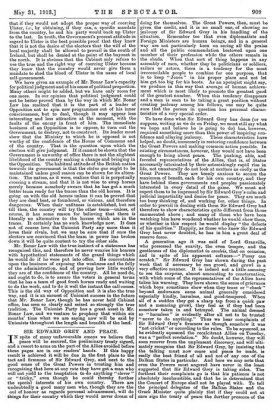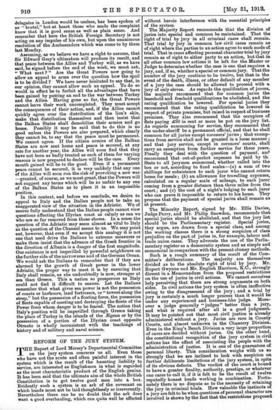SIR EDWARD GREY AND PEACE.
TN spite of many unfavourable omens we believe that peace will be secured, the preliminary treaty signed, and a resort to arms on the part of the Allies avoided before these pages are in our readers' hands. If this happy result is achieved it will be due in the first place to the tact and firmness of Sir Edward Grey, and next to the good sense of the Great Powers in trusting him and recognizing that here at any rate they have got a man who will not yield to the temptation to do anything " clever " or " tricky," even though he could thereby further the special interests of his own country. There are undoubtedly a good many men who, though they are the oul of honour as regards personal advancement, will do things for their country which they would never dream of doing for themselves. The Great Powers, then, must be given the credit, and it is no small one, of showing no jealousy of Sir Edward Grey in his handling of the situation. Remember too that even diplomatists and Foreign Ministers are human beings, and in a general way are not particularly keen on seeing all the praise and all the public commendation bestowed upon one member of their profession while the others remain in the shade. When that sort of thing happens in any assembly of men, whether they be politicians or soldiers, sailors or actors, there is a tendency for the most irreconcilable people to combine for one purpose, that is to keep " Jones " in his proper place and not let him get too big for his boots. As an apologist might say, we produce in this way that average of human achieve- ment which is most likely to promote the greatest good of the greatest number. When this tendency disappears and a man is seen to be taking a great position without creating jealousy among his fellows, one may be quite sure that the person in question has personal charac- teristics of a very special order.
To have done what Sir Edward Grey has done (or we suppose, writing as we do on Friday, we must still say what we hope and believe he is going to do) has, however, required something more than this power of inspiring con- fidence and allaying jealousy. These characteristics have helped, no doubt, immensely in restoring confidence between the Great Powers and making common action possible. In existing circumstances, however, they would not have been enough to bring about peace. The pushing, able, and forceful representatives of the Allies, that is, of States necessarily intoxicated by their astonishingly rapid rise in life, not unnaturally do not look at matters as coolly as the Great Powers. They are keenly anxious to secure the maximum of benefit, each for his own country, and they have behind them governments and peoples passionately interested in every detail of the game. We must not expect them to be impressed by Sir Edward Grey's calm and judicial impartiality and desire for peace. They are much too busy thinking of, and working for, other things. In order to prevail in dealing with them Sir Edward Grey had therefore to show characteristics quite different from those enumerated above ; and many of those who have been watching him have wondered whether he would show them, or whether in this respect he would display " the defects of his qualities." Happily, as those who knew Sir Edward Grey best never doubted, he has in him a great deal of reserve force.
A generation ago it was said of Lord Granville, who possessed the suavity, the even temper, and the gentleness of the diplomatist in excelsis, that on occasion, and in spite of his apparent softness—" Pussy can scratch." Sir Edward Grey has shown during the past week that if necessary he can growl, and growl in a very effective manner. It is indeed not a little amusing to see the surprise, almost amounting to consternation, with which some of the representatives of the Allies have taken his warning. They have shown the sense of grievance which boys sometimes show when they tease or " cheek " beyond endurance some animal generally considered especially kindly, harmless, and good-tempered. When all of a sudden they get a sharp tap from a quick paw and a menacing growl, they feel as if they had been somehow taken in and betrayed. The animal deemed so " harmless " is evidently after all not to be trusted " never to do anything." Thus we hear complaints of Sir Edward Grey's firmness as though somehow it was "not cricket" or according to the rules. To be squeezed, as he evidently squeezed the recalcitrant Allies on Tuesday, was a " perfect revelation." No doubt, however, they will soon recover from the unpleasant discovery, and will ulti- mately recognise that Sir Edward Grey, by insisting that the talking must now cease and peace be made, is really the best friend of all and not of any one of the Balkan States in particular. And here we may note that even the Powers most angered have never in the least suggested that Sir Edward Grey is taking sides. The furthest their complaints go is that his patience is not absolutely inexhaustible, and that he is determined that the Concert of Europe shall not be played with. To tell the principal delegates of the Balkan States and the Greek Minister quite plainly that if they could not at once sign the treaty of peace the further presence of the delegates in London would be useless, has been spoken of as " brutal," but at heart those who made the complaint know that it is good sense as well as plain sense. And remember that here the British Foreign Secretary is not acting on any impulse of his own, but upon the unanimous resolution of the Ambassadors which was come to by them last Monday.
Assuming, as we believe we have a right to assume, that Sir Edward Grey's ultimatum will produce its result, and that peace between the Allies and Turkey will, as we have said, be signed before the end of the week, we must ask, " What next ? " Are the Great Powers now going to allow an appeal to arms over the question how the spoil is to be divided ? We have never hesitated to say that, in our opinion, they cannot allow such an appeal. To do so would in effect be to forfeit all the advantages that have been gained by putting an end to the war between Turkey and the Allies. Having gone so far, the Great Powers cannot leave their work uncompleted. They must accept the consequences of their action, and, if the Allies cannot quickly agree over the distribution of the lion's skin, make that distribution themselves and then insist that the Balkan States shall demobilize their armies and go home. Possibly it may be said that to do this is no good unless the Powers are also prepared, which clearly they cannot be, to say that the peace must be permanent. We cannot agree. If the citizen armies of the Balkan States are now sent home and peace is secured, at any rate for another year, the Allies will soon find that they have not been as badly treated as each of them for varying reasons is now prepared to declare will be the case. Every month gained will be to the good. Even if a permanent peace cannot be secured, it is very unlikely that any one of the Allies will soon run the risk of provoking a new war —granted, of course, as we must grant, that the Powers will not suggest any terms which will be so unfair to any one of the Balkan States as to place it in an impossible position. In this context, and before we conclude, we desire to appeal to Italy and the Italian people not to take an exaggerated view of the situation in the Adriatic. We of course fully understand that the Italian people cannot view questions affecting the Illyrian coast as calmly as can we who are so far removed from those shores. In a sense the question of the Adriatic may seem almost as vital to Italy as the question of the Channel seems to us. We may point out, however, that even if we accept this analogy it is not one that need drive the Italians to extreme measures or make them insist that the advance of the Greek frontier in the direction of Albania is a danger of the first magnitude. Our existence is not imperilled by powerful neighbours on the further side of the narrow seas and of the German Ocean. We would ask the Italians to remember that if they are alarmed by the growth of Greek power in the lower Adriatic, the proper way to meet it is by ensuring that Italy shall remain, as she undoubtedly is now, stronger at sea than Greece. This a nation so prosperous as Italy could not find it difficult to ensure. Let the Italians remember that what gives sea power is not the possession of coasts or harbours, land fortresses, or " towers along the steep," but the possession of a floating force, the possession of fleets capable of meeting and destroying the fleets of the Power from whom danger is to be feared. The notion that Italy's position will be imperilled through Greece taking the place of Turkey in the islands of the .gean or by the possession of a portion of the Illyrian coast opposite Otranto is wholly inconsistent with the teachings of history and of military and naval science.



















































 Previous page
Previous page